University Advanced Qualitative Research Methods Paper
VerifiedAdded on 2023/06/10
|13
|3459
|172
Essay
AI Summary
This paper provides a comprehensive overview of advanced qualitative research methods. It begins with an introduction emphasizing the growing importance of qualitative research across various disciplines, including health, education, and social sciences. The paper then delves into the 'qualitativeness' of qualitative research, discussing the diverse philosophical underpinnings and methodologies that define it, such as interpretivist sociological conventions and critical psychology approaches. It explores research paradigms, defining their role in shaping research perspectives and guiding the researcher's approach. The paper further examines the significance of literature reviews, emphasizing their role in clarifying research potential and informing the researcher's strategies, with examples from sustainable development and cultural conflict studies. It also discusses the importance of qualitative research design, addressing essential questions related to design and its relation to the research paradigm. The paper covers research methods, data collection, data analysis, findings, and the critical aspects of validity and reliability in qualitative research. The paper provides individual reflections on these methods, drawing on insights from various academic sources to offer a thorough exploration of qualitative research principles and practices.
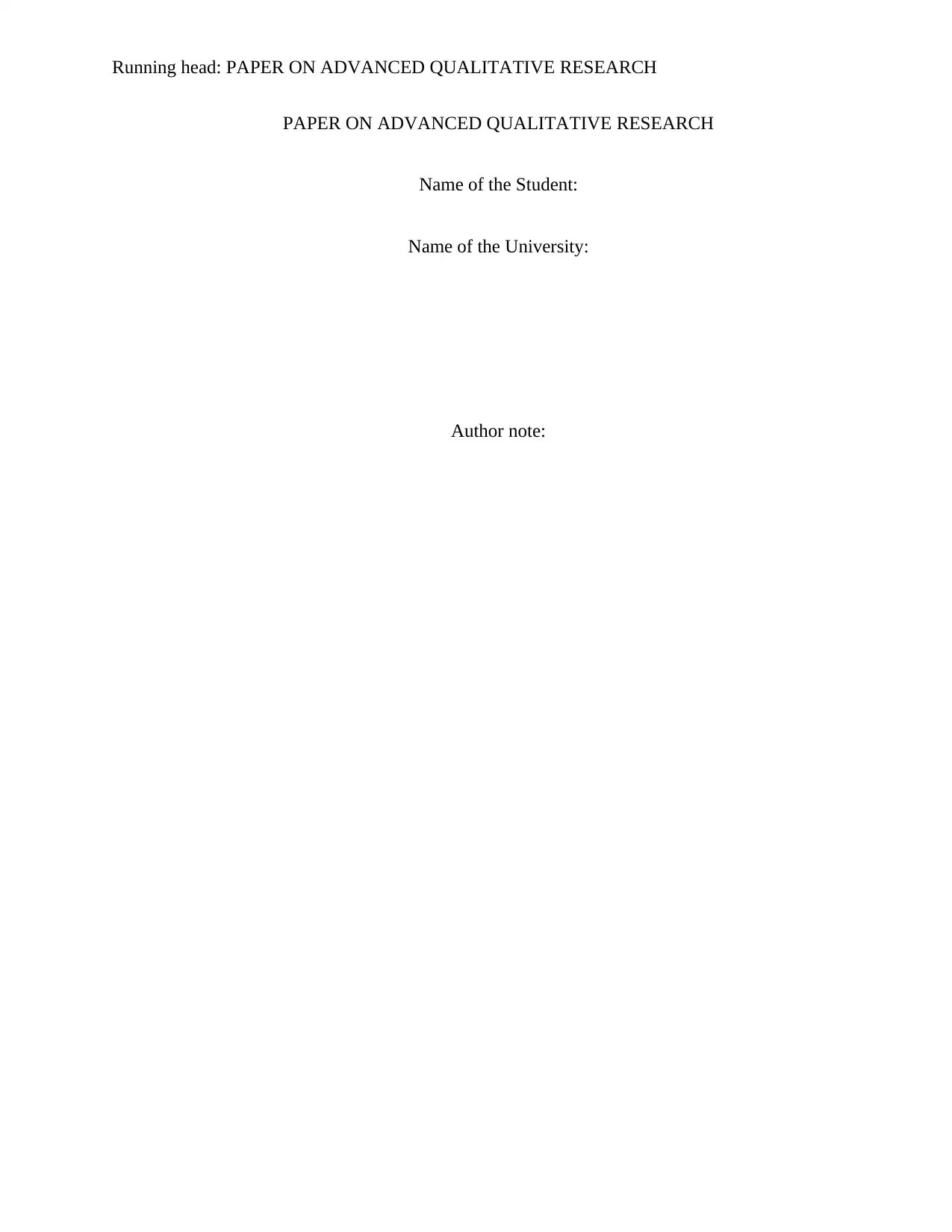
Running head: PAPER ON ADVANCED QUALITATIVE RESEARCH
PAPER ON ADVANCED QUALITATIVE RESEARCH
Name of the Student:
Name of the University:
Author note:
PAPER ON ADVANCED QUALITATIVE RESEARCH
Name of the Student:
Name of the University:
Author note:
Paraphrase This Document
Need a fresh take? Get an instant paraphrase of this document with our AI Paraphraser
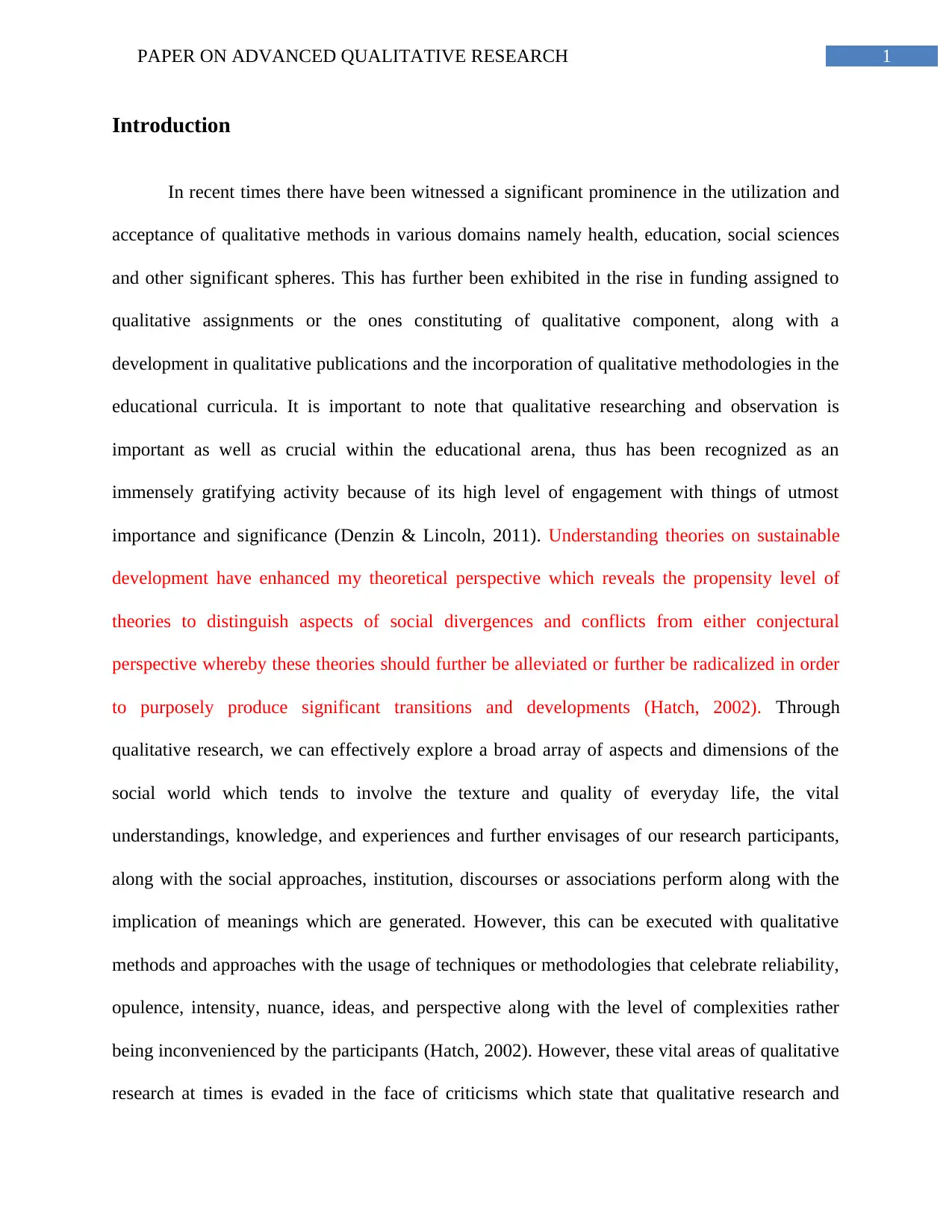
1PAPER ON ADVANCED QUALITATIVE RESEARCH
Introduction
In recent times there have been witnessed a significant prominence in the utilization and
acceptance of qualitative methods in various domains namely health, education, social sciences
and other significant spheres. This has further been exhibited in the rise in funding assigned to
qualitative assignments or the ones constituting of qualitative component, along with a
development in qualitative publications and the incorporation of qualitative methodologies in the
educational curricula. It is important to note that qualitative researching and observation is
important as well as crucial within the educational arena, thus has been recognized as an
immensely gratifying activity because of its high level of engagement with things of utmost
importance and significance (Denzin & Lincoln, 2011). Understanding theories on sustainable
development have enhanced my theoretical perspective which reveals the propensity level of
theories to distinguish aspects of social divergences and conflicts from either conjectural
perspective whereby these theories should further be alleviated or further be radicalized in order
to purposely produce significant transitions and developments (Hatch, 2002). Through
qualitative research, we can effectively explore a broad array of aspects and dimensions of the
social world which tends to involve the texture and quality of everyday life, the vital
understandings, knowledge, and experiences and further envisages of our research participants,
along with the social approaches, institution, discourses or associations perform along with the
implication of meanings which are generated. However, this can be executed with qualitative
methods and approaches with the usage of techniques or methodologies that celebrate reliability,
opulence, intensity, nuance, ideas, and perspective along with the level of complexities rather
being inconvenienced by the participants (Hatch, 2002). However, these vital areas of qualitative
research at times is evaded in the face of criticisms which state that qualitative research and
Introduction
In recent times there have been witnessed a significant prominence in the utilization and
acceptance of qualitative methods in various domains namely health, education, social sciences
and other significant spheres. This has further been exhibited in the rise in funding assigned to
qualitative assignments or the ones constituting of qualitative component, along with a
development in qualitative publications and the incorporation of qualitative methodologies in the
educational curricula. It is important to note that qualitative researching and observation is
important as well as crucial within the educational arena, thus has been recognized as an
immensely gratifying activity because of its high level of engagement with things of utmost
importance and significance (Denzin & Lincoln, 2011). Understanding theories on sustainable
development have enhanced my theoretical perspective which reveals the propensity level of
theories to distinguish aspects of social divergences and conflicts from either conjectural
perspective whereby these theories should further be alleviated or further be radicalized in order
to purposely produce significant transitions and developments (Hatch, 2002). Through
qualitative research, we can effectively explore a broad array of aspects and dimensions of the
social world which tends to involve the texture and quality of everyday life, the vital
understandings, knowledge, and experiences and further envisages of our research participants,
along with the social approaches, institution, discourses or associations perform along with the
implication of meanings which are generated. However, this can be executed with qualitative
methods and approaches with the usage of techniques or methodologies that celebrate reliability,
opulence, intensity, nuance, ideas, and perspective along with the level of complexities rather
being inconvenienced by the participants (Hatch, 2002). However, these vital areas of qualitative
research at times is evaded in the face of criticisms which state that qualitative research and
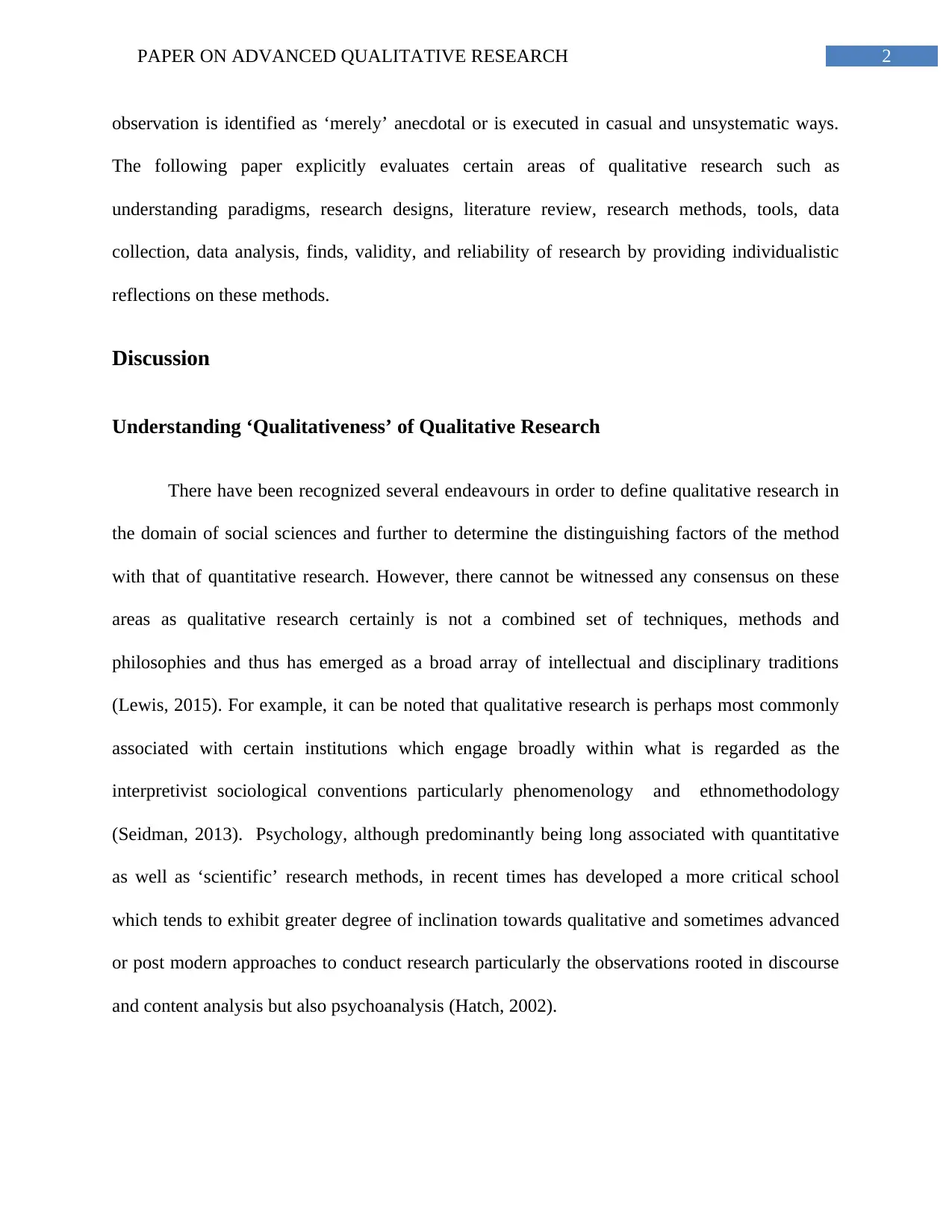
2PAPER ON ADVANCED QUALITATIVE RESEARCH
observation is identified as ‘merely’ anecdotal or is executed in casual and unsystematic ways.
The following paper explicitly evaluates certain areas of qualitative research such as
understanding paradigms, research designs, literature review, research methods, tools, data
collection, data analysis, finds, validity, and reliability of research by providing individualistic
reflections on these methods.
Discussion
Understanding ‘Qualitativeness’ of Qualitative Research
There have been recognized several endeavours in order to define qualitative research in
the domain of social sciences and further to determine the distinguishing factors of the method
with that of quantitative research. However, there cannot be witnessed any consensus on these
areas as qualitative research certainly is not a combined set of techniques, methods and
philosophies and thus has emerged as a broad array of intellectual and disciplinary traditions
(Lewis, 2015). For example, it can be noted that qualitative research is perhaps most commonly
associated with certain institutions which engage broadly within what is regarded as the
interpretivist sociological conventions particularly phenomenology and ethnomethodology
(Seidman, 2013). Psychology, although predominantly being long associated with quantitative
as well as ‘scientific’ research methods, in recent times has developed a more critical school
which tends to exhibit greater degree of inclination towards qualitative and sometimes advanced
or post modern approaches to conduct research particularly the observations rooted in discourse
and content analysis but also psychoanalysis (Hatch, 2002).
observation is identified as ‘merely’ anecdotal or is executed in casual and unsystematic ways.
The following paper explicitly evaluates certain areas of qualitative research such as
understanding paradigms, research designs, literature review, research methods, tools, data
collection, data analysis, finds, validity, and reliability of research by providing individualistic
reflections on these methods.
Discussion
Understanding ‘Qualitativeness’ of Qualitative Research
There have been recognized several endeavours in order to define qualitative research in
the domain of social sciences and further to determine the distinguishing factors of the method
with that of quantitative research. However, there cannot be witnessed any consensus on these
areas as qualitative research certainly is not a combined set of techniques, methods and
philosophies and thus has emerged as a broad array of intellectual and disciplinary traditions
(Lewis, 2015). For example, it can be noted that qualitative research is perhaps most commonly
associated with certain institutions which engage broadly within what is regarded as the
interpretivist sociological conventions particularly phenomenology and ethnomethodology
(Seidman, 2013). Psychology, although predominantly being long associated with quantitative
as well as ‘scientific’ research methods, in recent times has developed a more critical school
which tends to exhibit greater degree of inclination towards qualitative and sometimes advanced
or post modern approaches to conduct research particularly the observations rooted in discourse
and content analysis but also psychoanalysis (Hatch, 2002).
⊘ This is a preview!⊘
Do you want full access?
Subscribe today to unlock all pages.

Trusted by 1+ million students worldwide
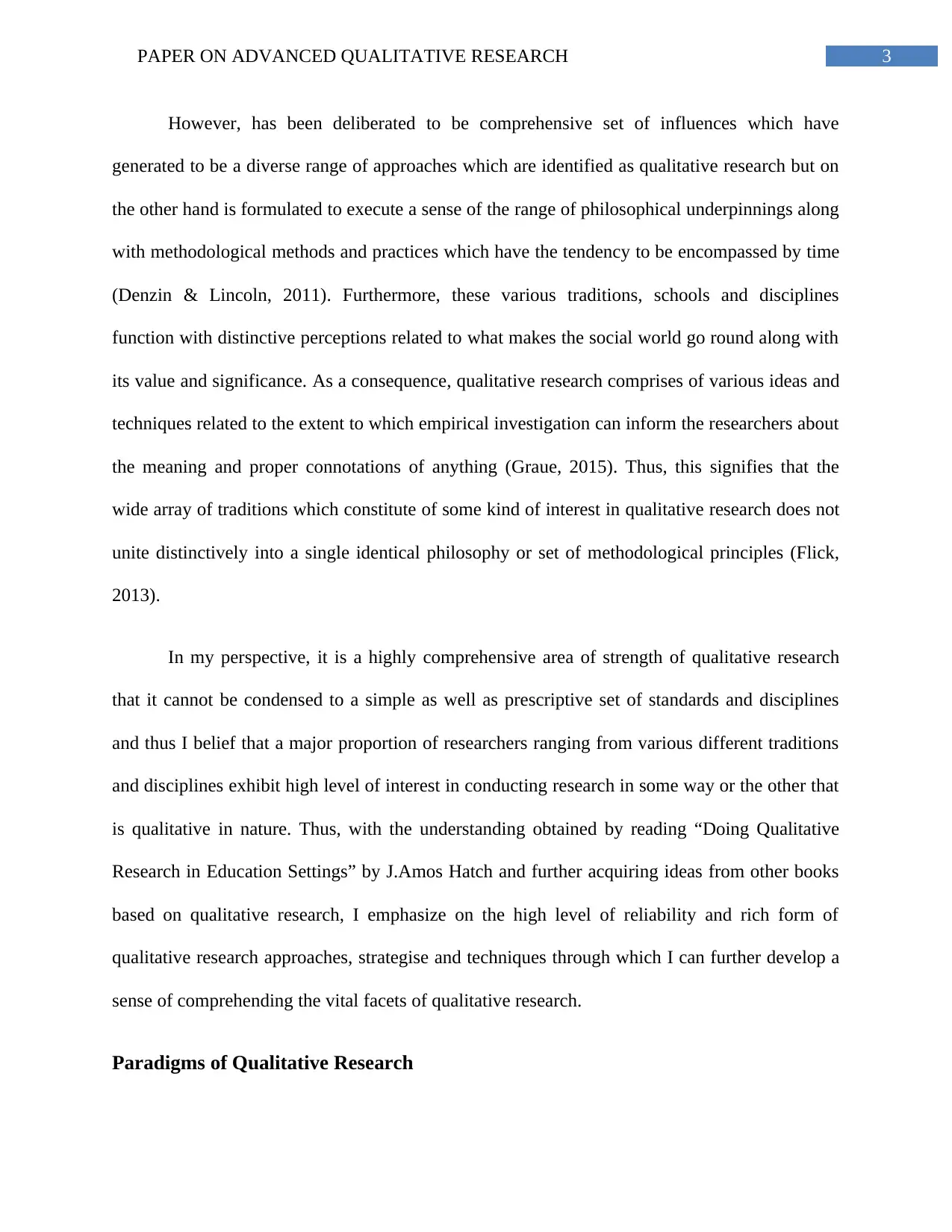
3PAPER ON ADVANCED QUALITATIVE RESEARCH
However, has been deliberated to be comprehensive set of influences which have
generated to be a diverse range of approaches which are identified as qualitative research but on
the other hand is formulated to execute a sense of the range of philosophical underpinnings along
with methodological methods and practices which have the tendency to be encompassed by time
(Denzin & Lincoln, 2011). Furthermore, these various traditions, schools and disciplines
function with distinctive perceptions related to what makes the social world go round along with
its value and significance. As a consequence, qualitative research comprises of various ideas and
techniques related to the extent to which empirical investigation can inform the researchers about
the meaning and proper connotations of anything (Graue, 2015). Thus, this signifies that the
wide array of traditions which constitute of some kind of interest in qualitative research does not
unite distinctively into a single identical philosophy or set of methodological principles (Flick,
2013).
In my perspective, it is a highly comprehensive area of strength of qualitative research
that it cannot be condensed to a simple as well as prescriptive set of standards and disciplines
and thus I belief that a major proportion of researchers ranging from various different traditions
and disciplines exhibit high level of interest in conducting research in some way or the other that
is qualitative in nature. Thus, with the understanding obtained by reading “Doing Qualitative
Research in Education Settings” by J.Amos Hatch and further acquiring ideas from other books
based on qualitative research, I emphasize on the high level of reliability and rich form of
qualitative research approaches, strategise and techniques through which I can further develop a
sense of comprehending the vital facets of qualitative research.
Paradigms of Qualitative Research
However, has been deliberated to be comprehensive set of influences which have
generated to be a diverse range of approaches which are identified as qualitative research but on
the other hand is formulated to execute a sense of the range of philosophical underpinnings along
with methodological methods and practices which have the tendency to be encompassed by time
(Denzin & Lincoln, 2011). Furthermore, these various traditions, schools and disciplines
function with distinctive perceptions related to what makes the social world go round along with
its value and significance. As a consequence, qualitative research comprises of various ideas and
techniques related to the extent to which empirical investigation can inform the researchers about
the meaning and proper connotations of anything (Graue, 2015). Thus, this signifies that the
wide array of traditions which constitute of some kind of interest in qualitative research does not
unite distinctively into a single identical philosophy or set of methodological principles (Flick,
2013).
In my perspective, it is a highly comprehensive area of strength of qualitative research
that it cannot be condensed to a simple as well as prescriptive set of standards and disciplines
and thus I belief that a major proportion of researchers ranging from various different traditions
and disciplines exhibit high level of interest in conducting research in some way or the other that
is qualitative in nature. Thus, with the understanding obtained by reading “Doing Qualitative
Research in Education Settings” by J.Amos Hatch and further acquiring ideas from other books
based on qualitative research, I emphasize on the high level of reliability and rich form of
qualitative research approaches, strategise and techniques through which I can further develop a
sense of comprehending the vital facets of qualitative research.
Paradigms of Qualitative Research
Paraphrase This Document
Need a fresh take? Get an instant paraphrase of this document with our AI Paraphraser
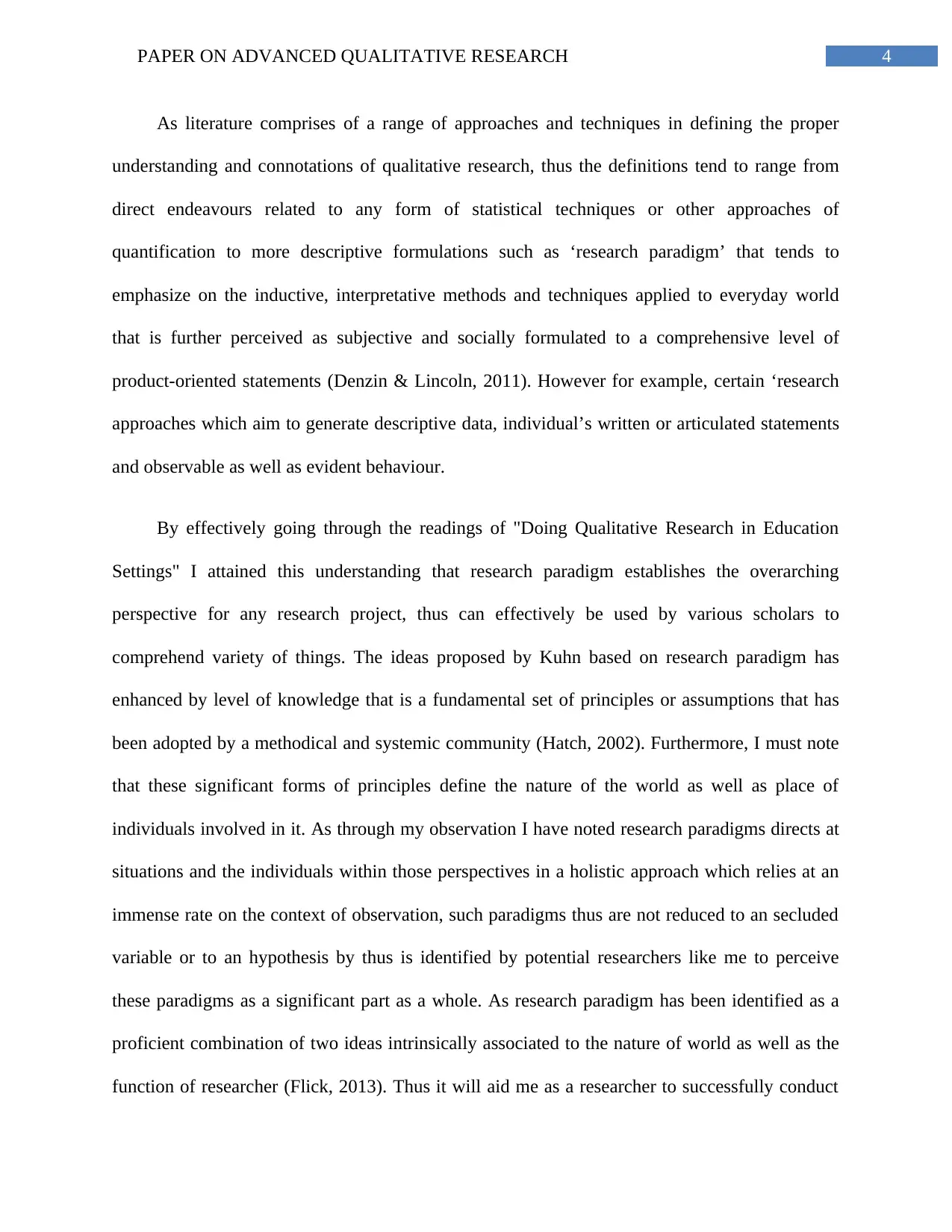
4PAPER ON ADVANCED QUALITATIVE RESEARCH
As literature comprises of a range of approaches and techniques in defining the proper
understanding and connotations of qualitative research, thus the definitions tend to range from
direct endeavours related to any form of statistical techniques or other approaches of
quantification to more descriptive formulations such as ‘research paradigm’ that tends to
emphasize on the inductive, interpretative methods and techniques applied to everyday world
that is further perceived as subjective and socially formulated to a comprehensive level of
product-oriented statements (Denzin & Lincoln, 2011). However for example, certain ‘research
approaches which aim to generate descriptive data, individual’s written or articulated statements
and observable as well as evident behaviour.
By effectively going through the readings of "Doing Qualitative Research in Education
Settings" I attained this understanding that research paradigm establishes the overarching
perspective for any research project, thus can effectively be used by various scholars to
comprehend variety of things. The ideas proposed by Kuhn based on research paradigm has
enhanced by level of knowledge that is a fundamental set of principles or assumptions that has
been adopted by a methodical and systemic community (Hatch, 2002). Furthermore, I must note
that these significant forms of principles define the nature of the world as well as place of
individuals involved in it. As through my observation I have noted research paradigms directs at
situations and the individuals within those perspectives in a holistic approach which relies at an
immense rate on the context of observation, such paradigms thus are not reduced to an secluded
variable or to an hypothesis by thus is identified by potential researchers like me to perceive
these paradigms as a significant part as a whole. As research paradigm has been identified as a
proficient combination of two ideas intrinsically associated to the nature of world as well as the
function of researcher (Flick, 2013). Thus it will aid me as a researcher to successfully conduct
As literature comprises of a range of approaches and techniques in defining the proper
understanding and connotations of qualitative research, thus the definitions tend to range from
direct endeavours related to any form of statistical techniques or other approaches of
quantification to more descriptive formulations such as ‘research paradigm’ that tends to
emphasize on the inductive, interpretative methods and techniques applied to everyday world
that is further perceived as subjective and socially formulated to a comprehensive level of
product-oriented statements (Denzin & Lincoln, 2011). However for example, certain ‘research
approaches which aim to generate descriptive data, individual’s written or articulated statements
and observable as well as evident behaviour.
By effectively going through the readings of "Doing Qualitative Research in Education
Settings" I attained this understanding that research paradigm establishes the overarching
perspective for any research project, thus can effectively be used by various scholars to
comprehend variety of things. The ideas proposed by Kuhn based on research paradigm has
enhanced by level of knowledge that is a fundamental set of principles or assumptions that has
been adopted by a methodical and systemic community (Hatch, 2002). Furthermore, I must note
that these significant forms of principles define the nature of the world as well as place of
individuals involved in it. As through my observation I have noted research paradigms directs at
situations and the individuals within those perspectives in a holistic approach which relies at an
immense rate on the context of observation, such paradigms thus are not reduced to an secluded
variable or to an hypothesis by thus is identified by potential researchers like me to perceive
these paradigms as a significant part as a whole. As research paradigm has been identified as a
proficient combination of two ideas intrinsically associated to the nature of world as well as the
function of researcher (Flick, 2013). Thus it will aid me as a researcher to successfully conduct
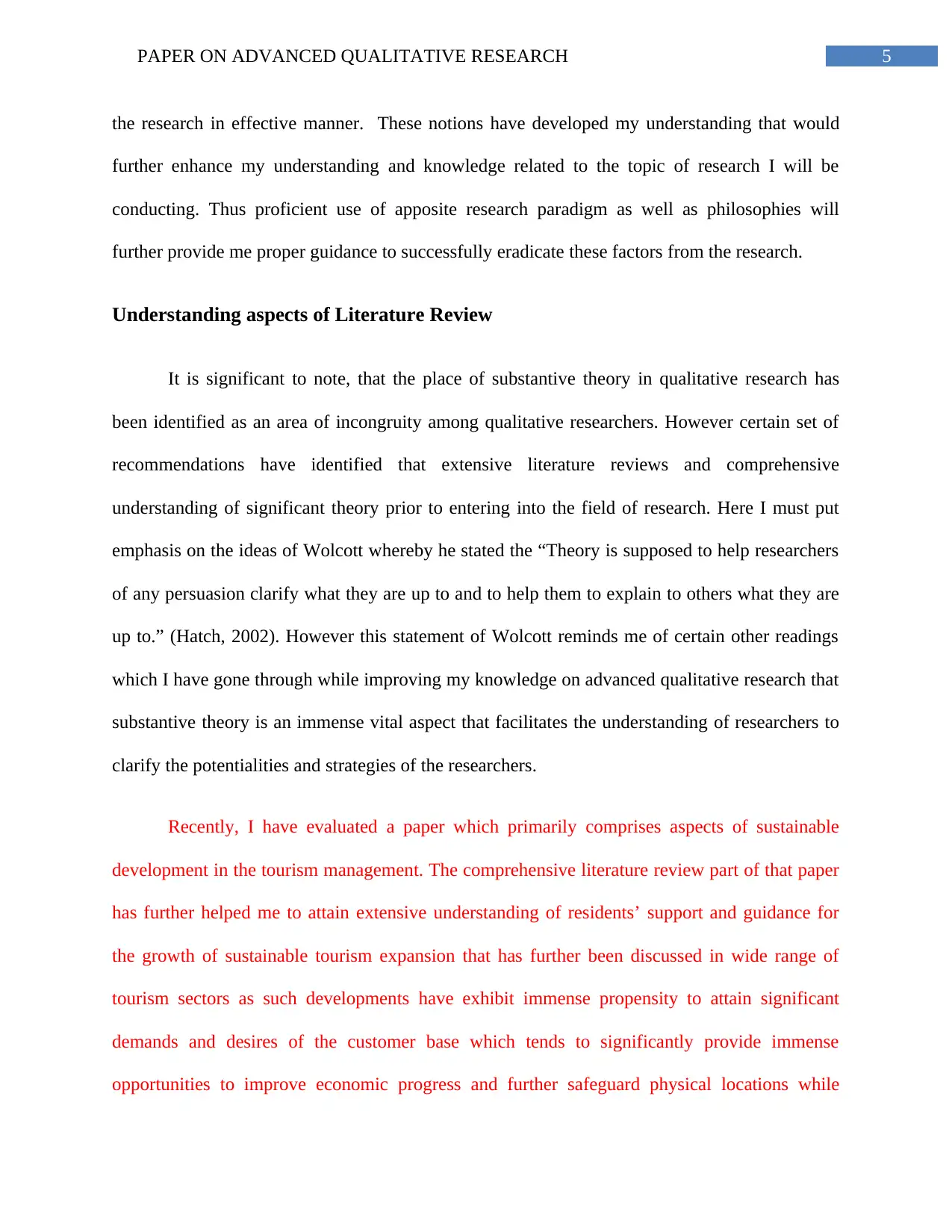
5PAPER ON ADVANCED QUALITATIVE RESEARCH
the research in effective manner. These notions have developed my understanding that would
further enhance my understanding and knowledge related to the topic of research I will be
conducting. Thus proficient use of apposite research paradigm as well as philosophies will
further provide me proper guidance to successfully eradicate these factors from the research.
Understanding aspects of Literature Review
It is significant to note, that the place of substantive theory in qualitative research has
been identified as an area of incongruity among qualitative researchers. However certain set of
recommendations have identified that extensive literature reviews and comprehensive
understanding of significant theory prior to entering into the field of research. Here I must put
emphasis on the ideas of Wolcott whereby he stated the “Theory is supposed to help researchers
of any persuasion clarify what they are up to and to help them to explain to others what they are
up to.” (Hatch, 2002). However this statement of Wolcott reminds me of certain other readings
which I have gone through while improving my knowledge on advanced qualitative research that
substantive theory is an immense vital aspect that facilitates the understanding of researchers to
clarify the potentialities and strategies of the researchers.
Recently, I have evaluated a paper which primarily comprises aspects of sustainable
development in the tourism management. The comprehensive literature review part of that paper
has further helped me to attain extensive understanding of residents’ support and guidance for
the growth of sustainable tourism expansion that has further been discussed in wide range of
tourism sectors as such developments have exhibit immense propensity to attain significant
demands and desires of the customer base which tends to significantly provide immense
opportunities to improve economic progress and further safeguard physical locations while
the research in effective manner. These notions have developed my understanding that would
further enhance my understanding and knowledge related to the topic of research I will be
conducting. Thus proficient use of apposite research paradigm as well as philosophies will
further provide me proper guidance to successfully eradicate these factors from the research.
Understanding aspects of Literature Review
It is significant to note, that the place of substantive theory in qualitative research has
been identified as an area of incongruity among qualitative researchers. However certain set of
recommendations have identified that extensive literature reviews and comprehensive
understanding of significant theory prior to entering into the field of research. Here I must put
emphasis on the ideas of Wolcott whereby he stated the “Theory is supposed to help researchers
of any persuasion clarify what they are up to and to help them to explain to others what they are
up to.” (Hatch, 2002). However this statement of Wolcott reminds me of certain other readings
which I have gone through while improving my knowledge on advanced qualitative research that
substantive theory is an immense vital aspect that facilitates the understanding of researchers to
clarify the potentialities and strategies of the researchers.
Recently, I have evaluated a paper which primarily comprises aspects of sustainable
development in the tourism management. The comprehensive literature review part of that paper
has further helped me to attain extensive understanding of residents’ support and guidance for
the growth of sustainable tourism expansion that has further been discussed in wide range of
tourism sectors as such developments have exhibit immense propensity to attain significant
demands and desires of the customer base which tends to significantly provide immense
opportunities to improve economic progress and further safeguard physical locations while
⊘ This is a preview!⊘
Do you want full access?
Subscribe today to unlock all pages.

Trusted by 1+ million students worldwide
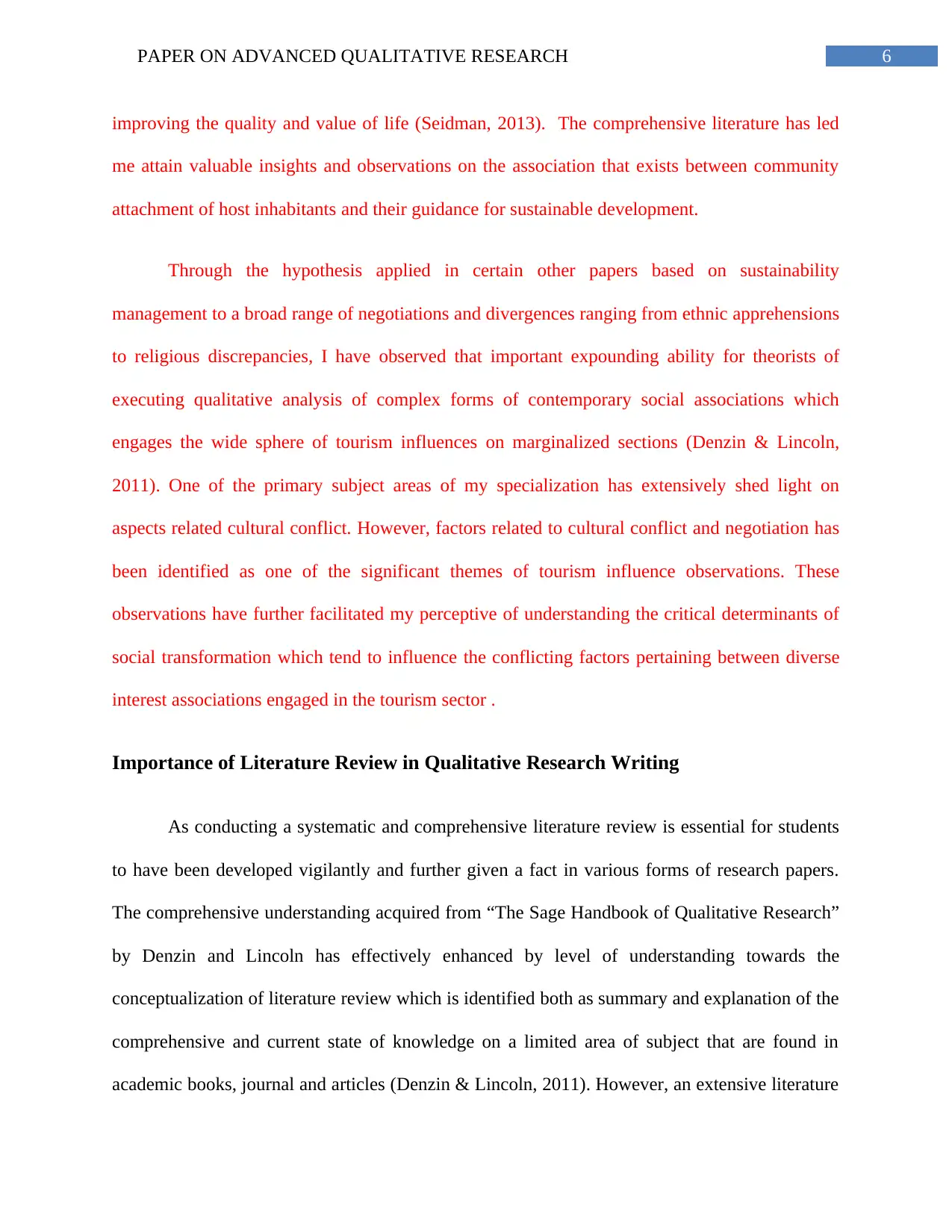
6PAPER ON ADVANCED QUALITATIVE RESEARCH
improving the quality and value of life (Seidman, 2013). The comprehensive literature has led
me attain valuable insights and observations on the association that exists between community
attachment of host inhabitants and their guidance for sustainable development.
Through the hypothesis applied in certain other papers based on sustainability
management to a broad range of negotiations and divergences ranging from ethnic apprehensions
to religious discrepancies, I have observed that important expounding ability for theorists of
executing qualitative analysis of complex forms of contemporary social associations which
engages the wide sphere of tourism influences on marginalized sections (Denzin & Lincoln,
2011). One of the primary subject areas of my specialization has extensively shed light on
aspects related cultural conflict. However, factors related to cultural conflict and negotiation has
been identified as one of the significant themes of tourism influence observations. These
observations have further facilitated my perceptive of understanding the critical determinants of
social transformation which tend to influence the conflicting factors pertaining between diverse
interest associations engaged in the tourism sector .
Importance of Literature Review in Qualitative Research Writing
As conducting a systematic and comprehensive literature review is essential for students
to have been developed vigilantly and further given a fact in various forms of research papers.
The comprehensive understanding acquired from “The Sage Handbook of Qualitative Research”
by Denzin and Lincoln has effectively enhanced by level of understanding towards the
conceptualization of literature review which is identified both as summary and explanation of the
comprehensive and current state of knowledge on a limited area of subject that are found in
academic books, journal and articles (Denzin & Lincoln, 2011). However, an extensive literature
improving the quality and value of life (Seidman, 2013). The comprehensive literature has led
me attain valuable insights and observations on the association that exists between community
attachment of host inhabitants and their guidance for sustainable development.
Through the hypothesis applied in certain other papers based on sustainability
management to a broad range of negotiations and divergences ranging from ethnic apprehensions
to religious discrepancies, I have observed that important expounding ability for theorists of
executing qualitative analysis of complex forms of contemporary social associations which
engages the wide sphere of tourism influences on marginalized sections (Denzin & Lincoln,
2011). One of the primary subject areas of my specialization has extensively shed light on
aspects related cultural conflict. However, factors related to cultural conflict and negotiation has
been identified as one of the significant themes of tourism influence observations. These
observations have further facilitated my perceptive of understanding the critical determinants of
social transformation which tend to influence the conflicting factors pertaining between diverse
interest associations engaged in the tourism sector .
Importance of Literature Review in Qualitative Research Writing
As conducting a systematic and comprehensive literature review is essential for students
to have been developed vigilantly and further given a fact in various forms of research papers.
The comprehensive understanding acquired from “The Sage Handbook of Qualitative Research”
by Denzin and Lincoln has effectively enhanced by level of understanding towards the
conceptualization of literature review which is identified both as summary and explanation of the
comprehensive and current state of knowledge on a limited area of subject that are found in
academic books, journal and articles (Denzin & Lincoln, 2011). However, an extensive literature
Paraphrase This Document
Need a fresh take? Get an instant paraphrase of this document with our AI Paraphraser
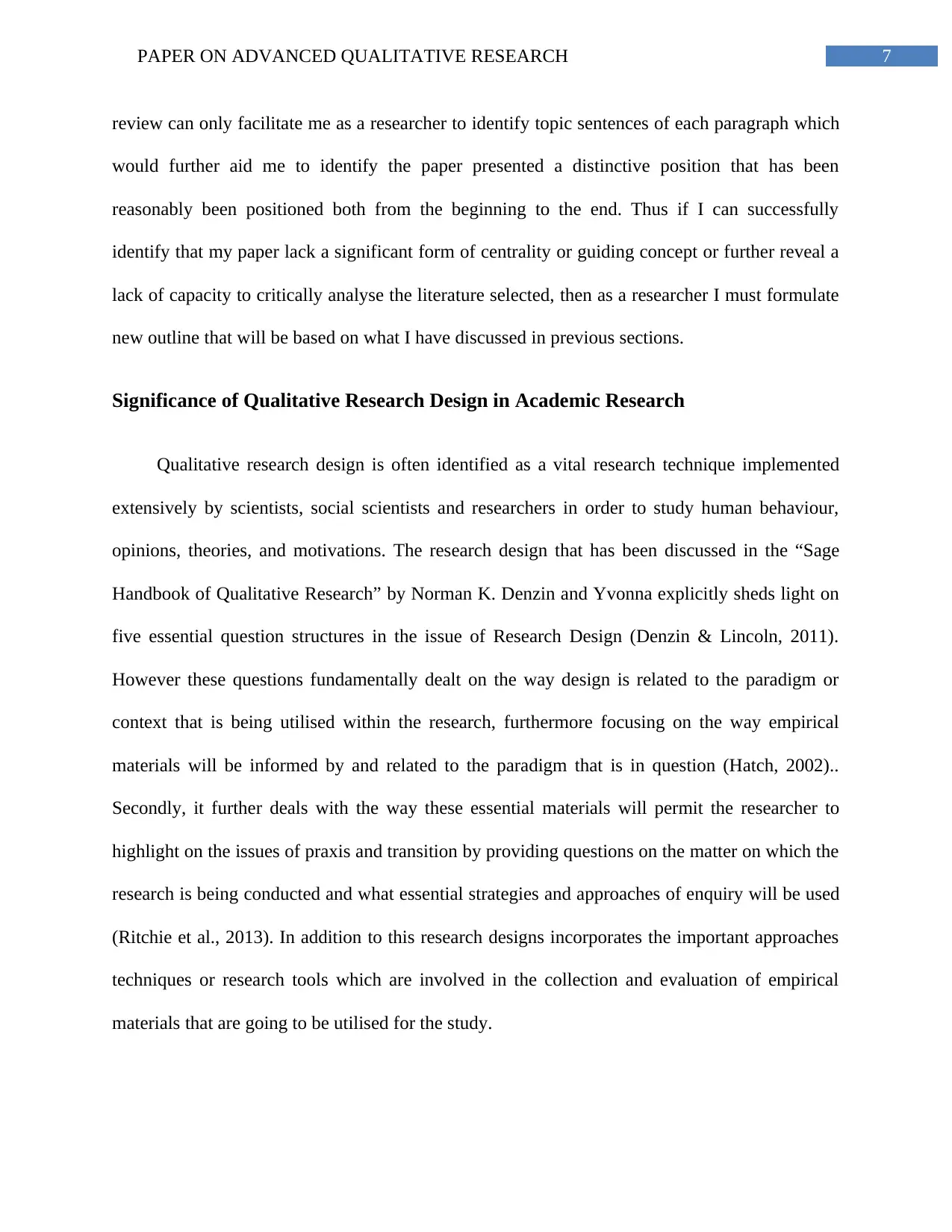
7PAPER ON ADVANCED QUALITATIVE RESEARCH
review can only facilitate me as a researcher to identify topic sentences of each paragraph which
would further aid me to identify the paper presented a distinctive position that has been
reasonably been positioned both from the beginning to the end. Thus if I can successfully
identify that my paper lack a significant form of centrality or guiding concept or further reveal a
lack of capacity to critically analyse the literature selected, then as a researcher I must formulate
new outline that will be based on what I have discussed in previous sections.
Significance of Qualitative Research Design in Academic Research
Qualitative research design is often identified as a vital research technique implemented
extensively by scientists, social scientists and researchers in order to study human behaviour,
opinions, theories, and motivations. The research design that has been discussed in the “Sage
Handbook of Qualitative Research” by Norman K. Denzin and Yvonna explicitly sheds light on
five essential question structures in the issue of Research Design (Denzin & Lincoln, 2011).
However these questions fundamentally dealt on the way design is related to the paradigm or
context that is being utilised within the research, furthermore focusing on the way empirical
materials will be informed by and related to the paradigm that is in question (Hatch, 2002)..
Secondly, it further deals with the way these essential materials will permit the researcher to
highlight on the issues of praxis and transition by providing questions on the matter on which the
research is being conducted and what essential strategies and approaches of enquiry will be used
(Ritchie et al., 2013). In addition to this research designs incorporates the important approaches
techniques or research tools which are involved in the collection and evaluation of empirical
materials that are going to be utilised for the study.
review can only facilitate me as a researcher to identify topic sentences of each paragraph which
would further aid me to identify the paper presented a distinctive position that has been
reasonably been positioned both from the beginning to the end. Thus if I can successfully
identify that my paper lack a significant form of centrality or guiding concept or further reveal a
lack of capacity to critically analyse the literature selected, then as a researcher I must formulate
new outline that will be based on what I have discussed in previous sections.
Significance of Qualitative Research Design in Academic Research
Qualitative research design is often identified as a vital research technique implemented
extensively by scientists, social scientists and researchers in order to study human behaviour,
opinions, theories, and motivations. The research design that has been discussed in the “Sage
Handbook of Qualitative Research” by Norman K. Denzin and Yvonna explicitly sheds light on
five essential question structures in the issue of Research Design (Denzin & Lincoln, 2011).
However these questions fundamentally dealt on the way design is related to the paradigm or
context that is being utilised within the research, furthermore focusing on the way empirical
materials will be informed by and related to the paradigm that is in question (Hatch, 2002)..
Secondly, it further deals with the way these essential materials will permit the researcher to
highlight on the issues of praxis and transition by providing questions on the matter on which the
research is being conducted and what essential strategies and approaches of enquiry will be used
(Ritchie et al., 2013). In addition to this research designs incorporates the important approaches
techniques or research tools which are involved in the collection and evaluation of empirical
materials that are going to be utilised for the study.
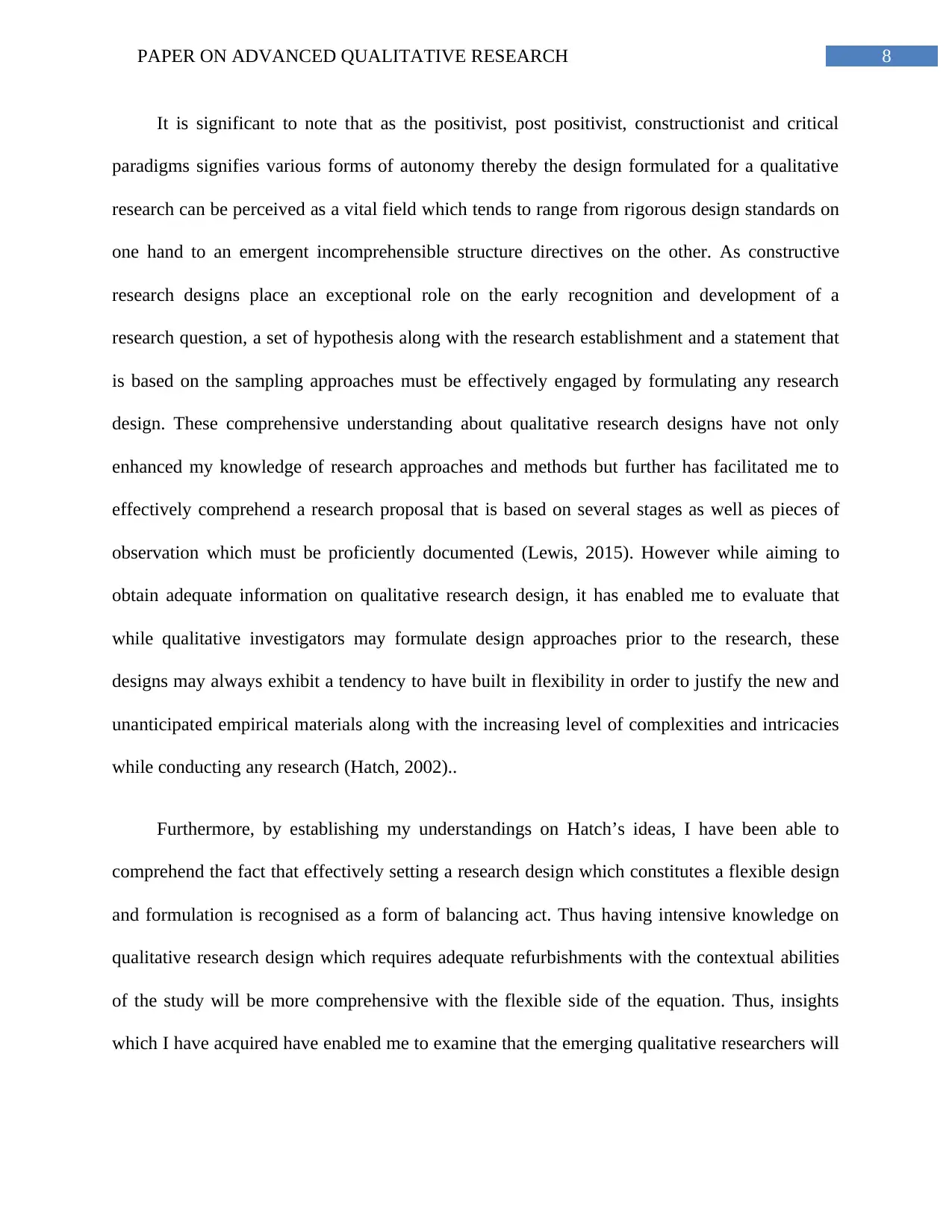
8PAPER ON ADVANCED QUALITATIVE RESEARCH
It is significant to note that as the positivist, post positivist, constructionist and critical
paradigms signifies various forms of autonomy thereby the design formulated for a qualitative
research can be perceived as a vital field which tends to range from rigorous design standards on
one hand to an emergent incomprehensible structure directives on the other. As constructive
research designs place an exceptional role on the early recognition and development of a
research question, a set of hypothesis along with the research establishment and a statement that
is based on the sampling approaches must be effectively engaged by formulating any research
design. These comprehensive understanding about qualitative research designs have not only
enhanced my knowledge of research approaches and methods but further has facilitated me to
effectively comprehend a research proposal that is based on several stages as well as pieces of
observation which must be proficiently documented (Lewis, 2015). However while aiming to
obtain adequate information on qualitative research design, it has enabled me to evaluate that
while qualitative investigators may formulate design approaches prior to the research, these
designs may always exhibit a tendency to have built in flexibility in order to justify the new and
unanticipated empirical materials along with the increasing level of complexities and intricacies
while conducting any research (Hatch, 2002)..
Furthermore, by establishing my understandings on Hatch’s ideas, I have been able to
comprehend the fact that effectively setting a research design which constitutes a flexible design
and formulation is recognised as a form of balancing act. Thus having intensive knowledge on
qualitative research design which requires adequate refurbishments with the contextual abilities
of the study will be more comprehensive with the flexible side of the equation. Thus, insights
which I have acquired have enabled me to examine that the emerging qualitative researchers will
It is significant to note that as the positivist, post positivist, constructionist and critical
paradigms signifies various forms of autonomy thereby the design formulated for a qualitative
research can be perceived as a vital field which tends to range from rigorous design standards on
one hand to an emergent incomprehensible structure directives on the other. As constructive
research designs place an exceptional role on the early recognition and development of a
research question, a set of hypothesis along with the research establishment and a statement that
is based on the sampling approaches must be effectively engaged by formulating any research
design. These comprehensive understanding about qualitative research designs have not only
enhanced my knowledge of research approaches and methods but further has facilitated me to
effectively comprehend a research proposal that is based on several stages as well as pieces of
observation which must be proficiently documented (Lewis, 2015). However while aiming to
obtain adequate information on qualitative research design, it has enabled me to evaluate that
while qualitative investigators may formulate design approaches prior to the research, these
designs may always exhibit a tendency to have built in flexibility in order to justify the new and
unanticipated empirical materials along with the increasing level of complexities and intricacies
while conducting any research (Hatch, 2002)..
Furthermore, by establishing my understandings on Hatch’s ideas, I have been able to
comprehend the fact that effectively setting a research design which constitutes a flexible design
and formulation is recognised as a form of balancing act. Thus having intensive knowledge on
qualitative research design which requires adequate refurbishments with the contextual abilities
of the study will be more comprehensive with the flexible side of the equation. Thus, insights
which I have acquired have enabled me to examine that the emerging qualitative researchers will
⊘ This is a preview!⊘
Do you want full access?
Subscribe today to unlock all pages.

Trusted by 1+ million students worldwide
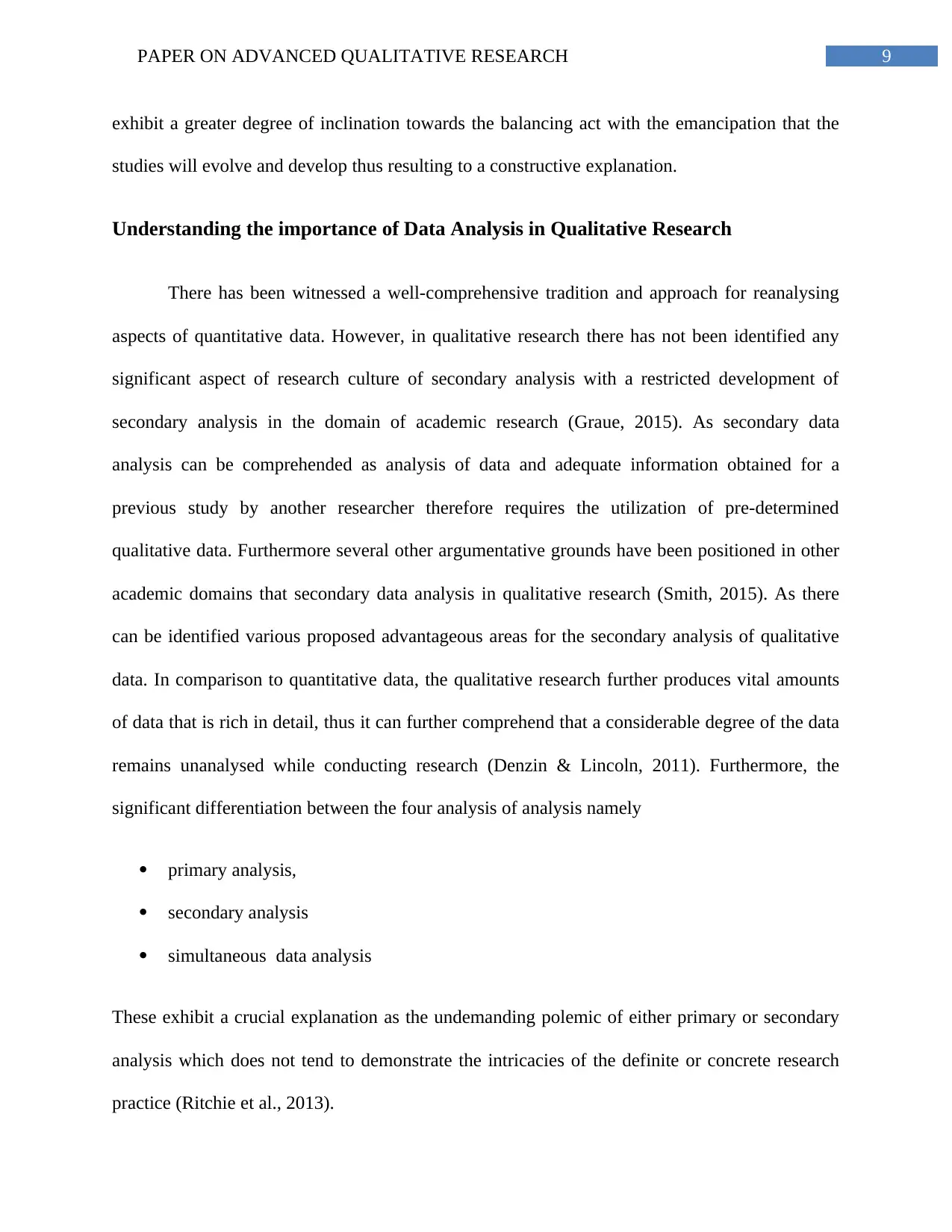
9PAPER ON ADVANCED QUALITATIVE RESEARCH
exhibit a greater degree of inclination towards the balancing act with the emancipation that the
studies will evolve and develop thus resulting to a constructive explanation.
Understanding the importance of Data Analysis in Qualitative Research
There has been witnessed a well-comprehensive tradition and approach for reanalysing
aspects of quantitative data. However, in qualitative research there has not been identified any
significant aspect of research culture of secondary analysis with a restricted development of
secondary analysis in the domain of academic research (Graue, 2015). As secondary data
analysis can be comprehended as analysis of data and adequate information obtained for a
previous study by another researcher therefore requires the utilization of pre-determined
qualitative data. Furthermore several other argumentative grounds have been positioned in other
academic domains that secondary data analysis in qualitative research (Smith, 2015). As there
can be identified various proposed advantageous areas for the secondary analysis of qualitative
data. In comparison to quantitative data, the qualitative research further produces vital amounts
of data that is rich in detail, thus it can further comprehend that a considerable degree of the data
remains unanalysed while conducting research (Denzin & Lincoln, 2011). Furthermore, the
significant differentiation between the four analysis of analysis namely
primary analysis,
secondary analysis
simultaneous data analysis
These exhibit a crucial explanation as the undemanding polemic of either primary or secondary
analysis which does not tend to demonstrate the intricacies of the definite or concrete research
practice (Ritchie et al., 2013).
exhibit a greater degree of inclination towards the balancing act with the emancipation that the
studies will evolve and develop thus resulting to a constructive explanation.
Understanding the importance of Data Analysis in Qualitative Research
There has been witnessed a well-comprehensive tradition and approach for reanalysing
aspects of quantitative data. However, in qualitative research there has not been identified any
significant aspect of research culture of secondary analysis with a restricted development of
secondary analysis in the domain of academic research (Graue, 2015). As secondary data
analysis can be comprehended as analysis of data and adequate information obtained for a
previous study by another researcher therefore requires the utilization of pre-determined
qualitative data. Furthermore several other argumentative grounds have been positioned in other
academic domains that secondary data analysis in qualitative research (Smith, 2015). As there
can be identified various proposed advantageous areas for the secondary analysis of qualitative
data. In comparison to quantitative data, the qualitative research further produces vital amounts
of data that is rich in detail, thus it can further comprehend that a considerable degree of the data
remains unanalysed while conducting research (Denzin & Lincoln, 2011). Furthermore, the
significant differentiation between the four analysis of analysis namely
primary analysis,
secondary analysis
simultaneous data analysis
These exhibit a crucial explanation as the undemanding polemic of either primary or secondary
analysis which does not tend to demonstrate the intricacies of the definite or concrete research
practice (Ritchie et al., 2013).
Paraphrase This Document
Need a fresh take? Get an instant paraphrase of this document with our AI Paraphraser
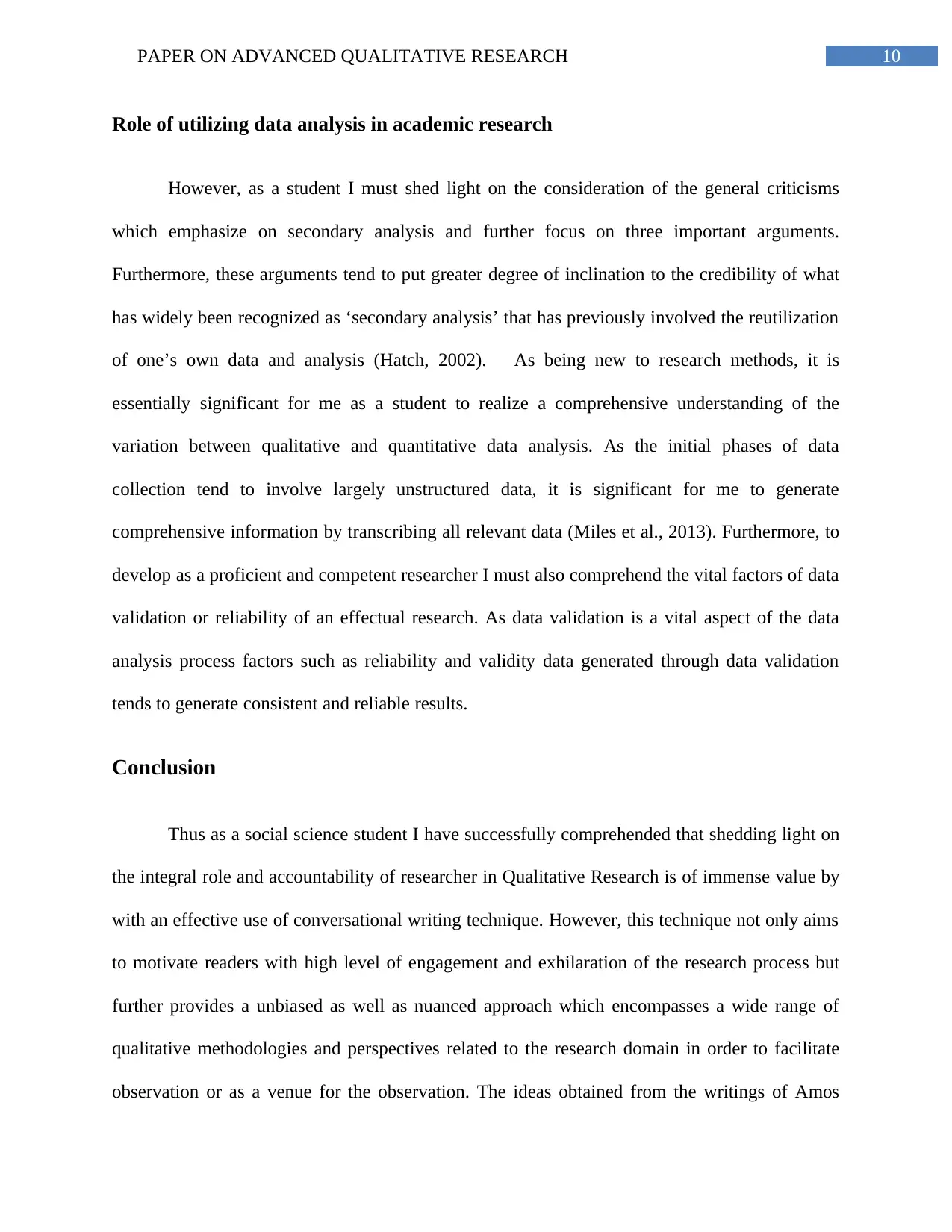
10PAPER ON ADVANCED QUALITATIVE RESEARCH
Role of utilizing data analysis in academic research
However, as a student I must shed light on the consideration of the general criticisms
which emphasize on secondary analysis and further focus on three important arguments.
Furthermore, these arguments tend to put greater degree of inclination to the credibility of what
has widely been recognized as ‘secondary analysis’ that has previously involved the reutilization
of one’s own data and analysis (Hatch, 2002). As being new to research methods, it is
essentially significant for me as a student to realize a comprehensive understanding of the
variation between qualitative and quantitative data analysis. As the initial phases of data
collection tend to involve largely unstructured data, it is significant for me to generate
comprehensive information by transcribing all relevant data (Miles et al., 2013). Furthermore, to
develop as a proficient and competent researcher I must also comprehend the vital factors of data
validation or reliability of an effectual research. As data validation is a vital aspect of the data
analysis process factors such as reliability and validity data generated through data validation
tends to generate consistent and reliable results.
Conclusion
Thus as a social science student I have successfully comprehended that shedding light on
the integral role and accountability of researcher in Qualitative Research is of immense value by
with an effective use of conversational writing technique. However, this technique not only aims
to motivate readers with high level of engagement and exhilaration of the research process but
further provides a unbiased as well as nuanced approach which encompasses a wide range of
qualitative methodologies and perspectives related to the research domain in order to facilitate
observation or as a venue for the observation. The ideas obtained from the writings of Amos
Role of utilizing data analysis in academic research
However, as a student I must shed light on the consideration of the general criticisms
which emphasize on secondary analysis and further focus on three important arguments.
Furthermore, these arguments tend to put greater degree of inclination to the credibility of what
has widely been recognized as ‘secondary analysis’ that has previously involved the reutilization
of one’s own data and analysis (Hatch, 2002). As being new to research methods, it is
essentially significant for me as a student to realize a comprehensive understanding of the
variation between qualitative and quantitative data analysis. As the initial phases of data
collection tend to involve largely unstructured data, it is significant for me to generate
comprehensive information by transcribing all relevant data (Miles et al., 2013). Furthermore, to
develop as a proficient and competent researcher I must also comprehend the vital factors of data
validation or reliability of an effectual research. As data validation is a vital aspect of the data
analysis process factors such as reliability and validity data generated through data validation
tends to generate consistent and reliable results.
Conclusion
Thus as a social science student I have successfully comprehended that shedding light on
the integral role and accountability of researcher in Qualitative Research is of immense value by
with an effective use of conversational writing technique. However, this technique not only aims
to motivate readers with high level of engagement and exhilaration of the research process but
further provides a unbiased as well as nuanced approach which encompasses a wide range of
qualitative methodologies and perspectives related to the research domain in order to facilitate
observation or as a venue for the observation. The ideas obtained from the writings of Amos

11PAPER ON ADVANCED QUALITATIVE RESEARCH
Hatch and Denzin & Lincoln have not only enhanced the level of my understanding about
qualitative research procedures but further has enabled me to deal efficiently with the areas of
complexities associated with data analysis as well as evaluating the research.
Hatch and Denzin & Lincoln have not only enhanced the level of my understanding about
qualitative research procedures but further has enabled me to deal efficiently with the areas of
complexities associated with data analysis as well as evaluating the research.
⊘ This is a preview!⊘
Do you want full access?
Subscribe today to unlock all pages.

Trusted by 1+ million students worldwide
1 out of 13
Related Documents
Your All-in-One AI-Powered Toolkit for Academic Success.
+13062052269
info@desklib.com
Available 24*7 on WhatsApp / Email
![[object Object]](/_next/static/media/star-bottom.7253800d.svg)
Unlock your academic potential
Copyright © 2020–2026 A2Z Services. All Rights Reserved. Developed and managed by ZUCOL.





